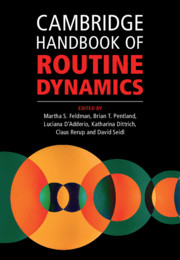15 results
Figures
-
- Book:
- Cambridge Handbook of Routine Dynamics
- Published online:
- 11 December 2021
- Print publication:
- 16 December 2021, pp ix-ix
-
- Chapter
- Export citation
Subject Index
-
- Book:
- Cambridge Handbook of Routine Dynamics
- Published online:
- 11 December 2021
- Print publication:
- 16 December 2021, pp 530-546
-
- Chapter
- Export citation
Copyright page
-
- Book:
- Cambridge Handbook of Routine Dynamics
- Published online:
- 11 December 2021
- Print publication:
- 16 December 2021, pp iv-iv
-
- Chapter
- Export citation
Author Index
-
- Book:
- Cambridge Handbook of Routine Dynamics
- Published online:
- 11 December 2021
- Print publication:
- 16 December 2021, pp 525-529
-
- Chapter
- Export citation
Preface
-
- Book:
- Cambridge Handbook of Routine Dynamics
- Published online:
- 11 December 2021
- Print publication:
- 16 December 2021, pp xv-xviii
-
- Chapter
- Export citation
Chapter 33 - Carnegie School Experiential Learning and Routine Dynamics
- from Part IV - Related Communities of Thought
-
-
- Book:
- Cambridge Handbook of Routine Dynamics
- Published online:
- 11 December 2021
- Print publication:
- 16 December 2021, pp 445-459
-
- Chapter
- Export citation
Part IV - Related Communities of Thought
-
- Book:
- Cambridge Handbook of Routine Dynamics
- Published online:
- 11 December 2021
- Print publication:
- 16 December 2021, pp 443-524
-
- Chapter
- Export citation
Chapter 1 - What Is Routine Dynamics?
-
-
- Book:
- Cambridge Handbook of Routine Dynamics
- Published online:
- 11 December 2021
- Print publication:
- 16 December 2021, pp 1-18
-
- Chapter
- Export citation
Tables
-
- Book:
- Cambridge Handbook of Routine Dynamics
- Published online:
- 11 December 2021
- Print publication:
- 16 December 2021, pp x-xi
-
- Chapter
- Export citation
Part II - Methodological Issues in Routine Dynamics Research
-
- Book:
- Cambridge Handbook of Routine Dynamics
- Published online:
- 11 December 2021
- Print publication:
- 16 December 2021, pp 101-206
-
- Chapter
- Export citation
Contents
-
- Book:
- Cambridge Handbook of Routine Dynamics
- Published online:
- 11 December 2021
- Print publication:
- 16 December 2021, pp v-viii
-
- Chapter
- Export citation
Contributors
-
- Book:
- Cambridge Handbook of Routine Dynamics
- Published online:
- 11 December 2021
- Print publication:
- 16 December 2021, pp xii-xiv
-
- Chapter
- Export citation
Part III - Themes in Routine Dynamics Research
-
- Book:
- Cambridge Handbook of Routine Dynamics
- Published online:
- 11 December 2021
- Print publication:
- 16 December 2021, pp 207-442
-
- Chapter
- Export citation
Part I - Theoretical Resources for Routine Dynamics Research
-
- Book:
- Cambridge Handbook of Routine Dynamics
- Published online:
- 11 December 2021
- Print publication:
- 16 December 2021, pp 19-100
-
- Chapter
- Export citation

Cambridge Handbook of Routine Dynamics
-
- Published online:
- 11 December 2021
- Print publication:
- 16 December 2021



